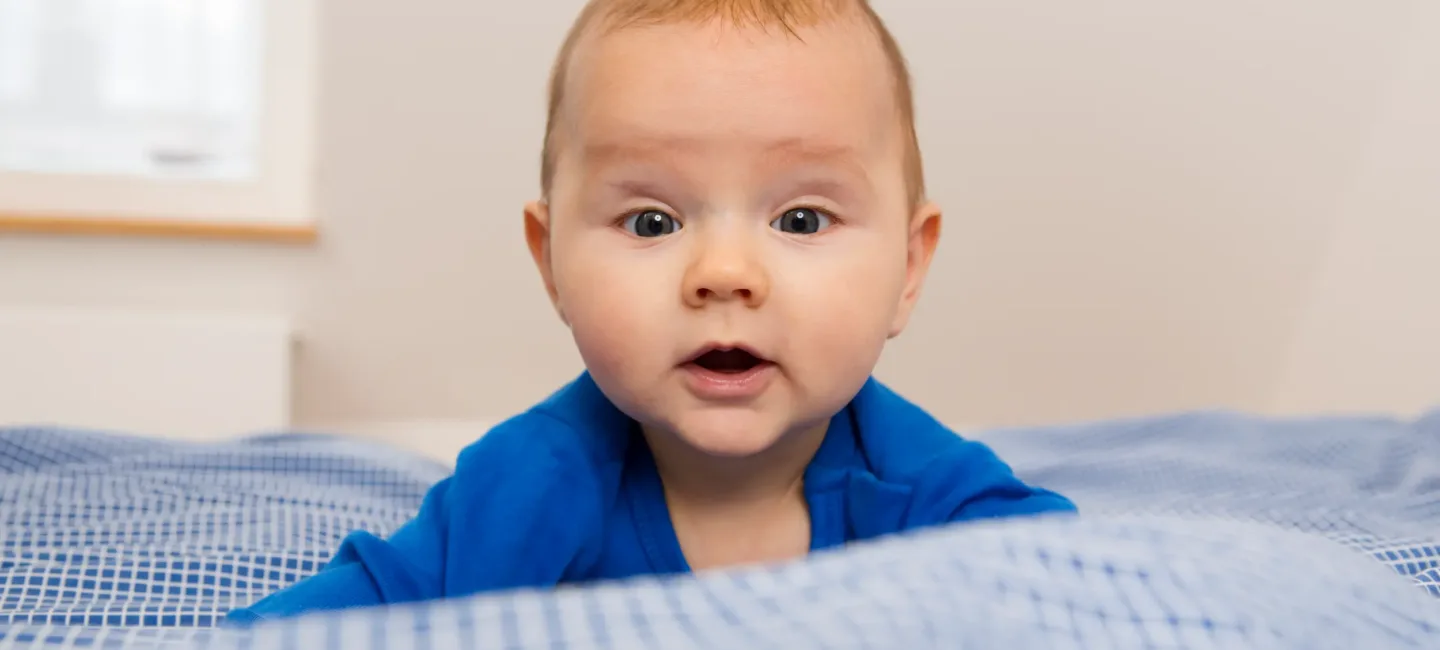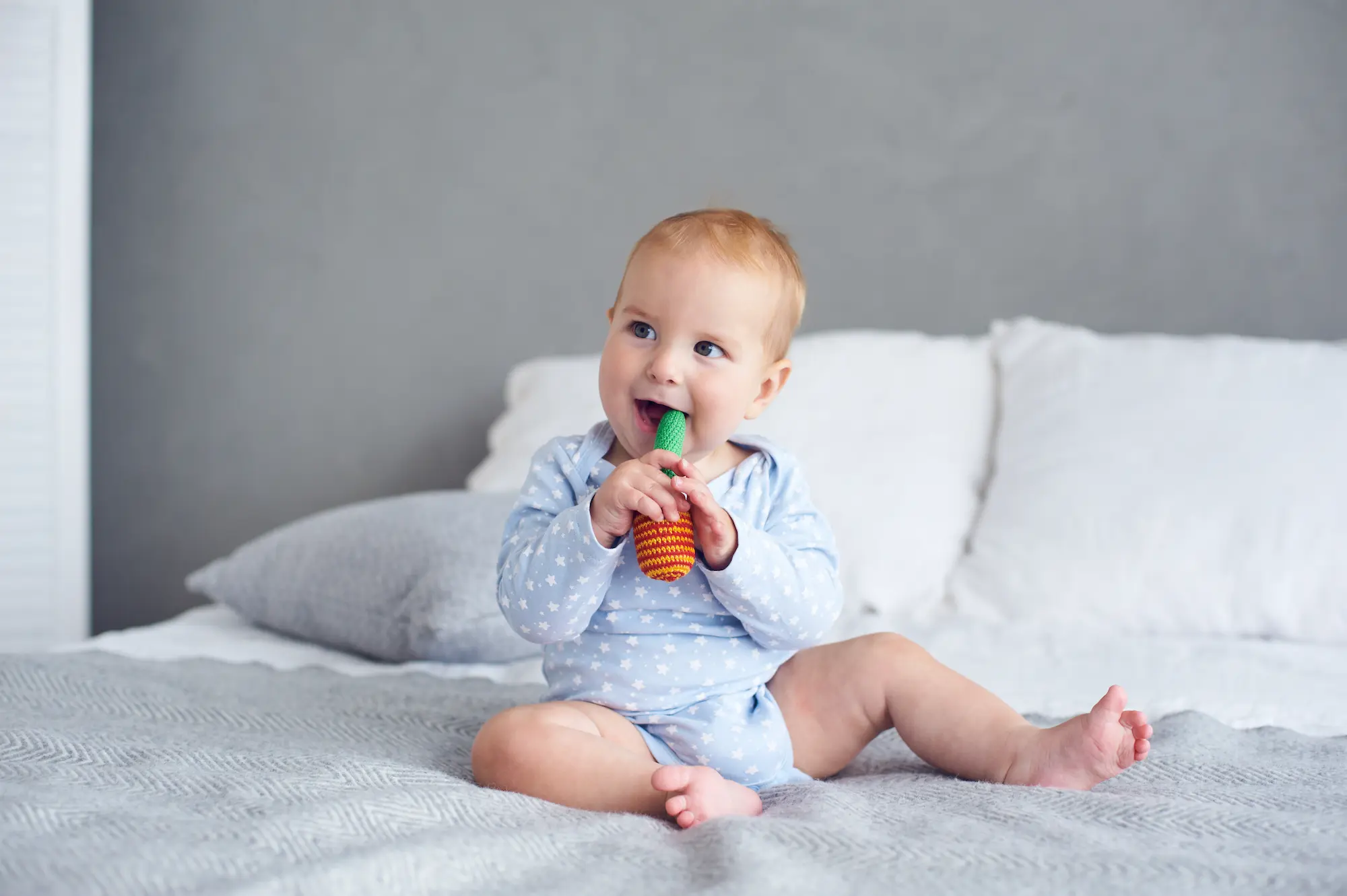
Taking a Bath After a Membrane Sweep: Precautions and Advice

At 7 months, your baby is in full exploration mode! They are starting to manipulate objects and are more and more comfortable on their tummy. What are the major milestones at this age?
7-month-old baby: an overview of this new stage.
Motor development in babies involves learning physical skills and mastering body movements. At 7 months, your baby is in full exploration mode.
Your baby is starting to control their wrists and to use their thumb and index finger to grasp objects by pinching. The “pincer grasp” is essential because it will later allow them to hold a pen, a spoon, and to dress themselves.
But your curious baby also dreams of going exploring! This is the time of the first movements. More and more comfortable on their tummy, they will experiment with rolling over, pushing with their feet, knees, arms, etc. Even if they are often frustrated at not being able to go where they want, this phase of experimenting with their body is crucial before discovering verticality.
Here are three tips so your baby can get the most out of this period:
Good to know: if your baby tends to move backwards rather than forwards, it’s because they haven’t yet fully coordinated their arms and legs. Your baby moves by pushing off the ground with their supports. If they push with their arms but forget to push with their legs, they move backwards! This can be frustrating and irritating for them.
To encourage them to move forward, you can place a toy in front of them: far enough that they need to make one or two movements to grab it, but not too far or they’ll think it’s unreachable and won’t try.
Your baby is becoming more and more sociable. You may have noticed that your baby prefers company when playing. Their relationship with others is evolving and they seek to attract the attention of people around them. They are drawn to other children (whom they now clearly distinguish from adults) and will seek contact. They try to touch them, in a kind way or sometimes a bit aggressively (hitting, biting…)! They are not aware that it hurts. It’s simply a way to get a reaction, an experiment.
The developmental milestones mentioned above are only general guidelines regarding a baby’s progress. Each child develops at their own pace! So don’t worry if your baby is moving faster or slower than another.
However, if you notice a sudden stop in development in your child, don’t hesitate to consult your healthcare professional.
Want to learn more? Feel free to download the May app, where you’ll find plenty of resources to support and guide you throughout your pregnancy.
At 7 months, it’s time for the first babbles!
“Bababa, mamama”: your baby repeats certain syllables endlessly. Behind this early language that may seem simple lie major cognitive abilities that already allow them to understand simple phrases (“we’re going to eat”, “time for bed”) or instructions associated with a gesture (“come”, “give”).
Your baby quickly learns to distinguish between two kinds of words: function words (the, in, on…), which are identified as structuring, and content words (doll, purée, flowers…) which are identified as changing. This second type, which makes up vocabulary, soon becomes their playground: first learning words from their daily life (blankie, bottle, cat, bed), then from broader areas (animals, fruits, tractors, jobs…).

For a few weeks now, your baby has been discovering food through diversification. They still drink a lot of milk, but the amounts decrease slightly: 500ml to 800ml per day spread over 2 or 3 bottles (for example one in the morning, one at snack time or in the evening, or both). As for the texture of the foods to introduce, here are the main stages:

Pediatric check-ups help monitor your child’s growth and development, but also detect potential medical issues early and keep their vaccination schedule up to date.
Vaccination plays a key role in strengthening your baby’s immune system, protecting them from potentially serious childhood illnesses. At 7 months, it is important to ensure that your child is up to date with the recommended vaccines. Don’t hesitate to contact your pediatrician for more information.

At 7 months, your baby is more and more comfortable on their tummy and seeks to explore their surroundings. They are also starting to control their wrists and pincer grasp by picking up objects with their thumb and index finger. They are growing every day and this is just the beginning!
**
Photos: Sandsun | ImageSourceCur | GalinkaZhi
This text was translated from French by an artificial intelligence. The information, advice, and sources it contains comply with French standards and may therefore not apply to your situation. Make sure to complement this reading by visiting the May US/UK app and consulting the healthcare professionals who are supporting you.
These resources might interest you

Taking a Bath After a Membrane Sweep: Precautions and Advice


Coloring your hair while pregnant: what precautions should you take?